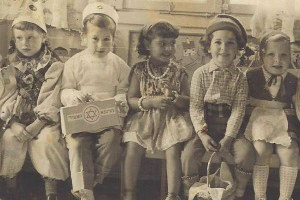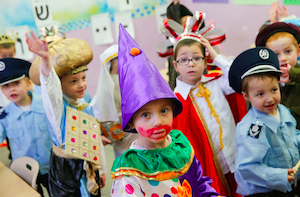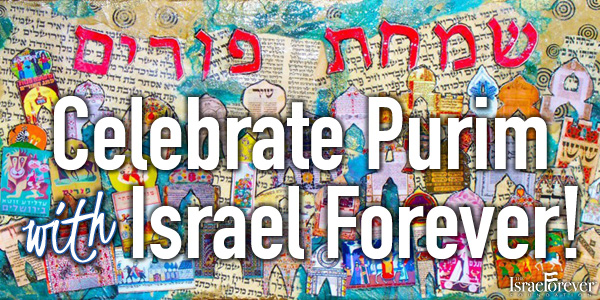The Purim Aliyah Connection
By Eric Gartman
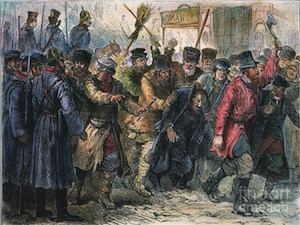
The Jews were blamed for the assassination of the Czar. In this painting, a Russian mob attacks a Jew while the police look on. All the while the crowds shouted: “The Jews have lorded it over us long enough!” “It is our turn now!” “They have got everything in their own hands! They grind us to death!”
With Purim approaching, it is fitting that we should remember another Purim day many years ago, a Purim unlike any other, one that played a major role in the development of the State of Israel.
On March 13, 1881 Jews were gathered in shuls throughout the Russia Empire. Russia was home to 80 percent of the world’s Jews at that time. The festivities were interrupted by the news that the Czar of Russia had been killed by anarchists. Jews throughout Russia mourned the loss of Alexander II, the progressive ruler who seemed to be leading Russia towards a new future with tolerance for all its peoples. But word got out that one of the six assassins was Jewish. It was enough to unleash the first modern pogrom – a violent riot directed at the Jews.
All across the country, drunken peasant mobs formed and attacked Jewish neighborhoods, killing, maiming, and raping in an orgy of unbridled violence. In Kiev, a huge crowd of toughs marched on the Jewish neighborhoods, attacking their homes. Window panes were smashed, doors ripped off and thrown about. The mob entered homes and stores, ransacking and looting. The streets quickly filled with desks furniture, household items, and anything else they could get their hands on. Clouds of feathers whirled in the air as the ruffians ripped apart pillows, beddings, and blankets. Not everything was destroyed; quite a few of attackers stole suits from stores. Others filled sacks and carts loaded with looted goods.
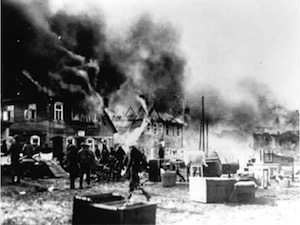
Pogrom 1881, place unknown. The Jewish homes burn as mobs rampage. "The situation is terrible and frightening! We are virtually under siege. The courtyards are barred up, and we keep peering through the grillwork to see if the mob is coming down on us, we all sleep in our clothes and without bedding so that if we are attacked, we immediately will be able to take the small children and flee. But will they let us flee? Will they have mercy on the youngsters? How long, O, God of Israel?"
Then it was on to the synagogues. Despite the strong bars and locks on the houses of worship, the crowd demolished these in short order. The scrolls of the law were torn apart and trampled with a special passion by the mob, reserved for the holy artifacts of the Jews. All the while the crowds shouted: “The Jews have lorded it over us long enough!” “It is our turn now!” “They have got everything in their own hands! They grind us to death!”
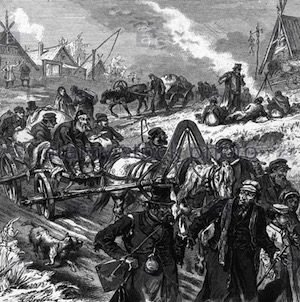
In this woodcut, Jews flee to the west from a pogrom. Their village burns in the background. Fed up with the situation in Russia, millions of Jews began emigrating abroad, including Palestine, where they sought to rebuild the Jewish home.
A Jewish man in Odessa recorded a chilling description of the pogrom as he and his family hid in a cellar: "The situation is terrible and frightening! We are virtually under siege. The courtyards are barred up, and we keep peering through the grillwork to see if the mob is coming down on us, we all sleep in our clothes and without bedding so that if we are attacked, we immediately will be able to take the small children and flee. But will they let us flee? Will they have mercy on the youngsters? How long, O, God of Israel?" Hundreds were attacked, raped, and maimed. Thousands were left homeless.
As a result of the pogroms, multitudes of Jews began to leave Russia. One of their destinations was Palestine. For while the Jews of Russia were oppressed, they were not rootless. They always viewed the Land of Israel as their home, a notion reinforced through their devotion to biblical study and daily prayer.
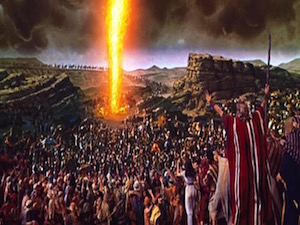
The biblical Hebrews had followed the Lord's pillar of fire through the Sinai back to the Promised Land. Now, the Bilu saw another pillar leading them back to the land or their ancestors, away from oppression: "this spark is again kindling and will shine for us, a true pillar of fire going before us on the road to Zion, while behind us is a pillar of cloud, the pillar of oppression, threatening to destroy us.“
Groups formed to bring Jews back to Palestine. The manifesto of one group, the Bilu, stated: “Nearly two thousand years have passed since, in an evil hour, after a heroic struggle, the glory of our Temple vanished in fire and our kings and chieftains changed their crowns and diadems for the chains of exile. We lost our country where dwelt our beloved sires. Into exile we took with us, of all our glories, only a spark of fire by which our Temple, the abode of our Great One, was engirdled, and this little spark kept us alive.” Moving into the modern era, the manifesto declares, "this spark is again kindling and will shine for us, a true pillar of fire going before us on the road to Zion."
It was the beginning of the Return. Soon, thousands of young pioneers flocked to Palestine, where they began to build the Jewish state. Their vision paid off. They had sought to build a refuge for endangered Jews; since the return to the Holy Land, untold numbers of Jews have found safety there. This Purim, let us remember how it began.

Eric Gartman is an intelligence analyst for the United States Department of Defense who has lived and studied in Israel and traveled extensively throughout the Middle East. Gartman is the author Return to Zion: The History of Modern Israel.
Recommended:
CELEBRATE PURIM WITH ISRAEL FOREVER
Bring Israel into your Purim celebrations today!
About the Author




